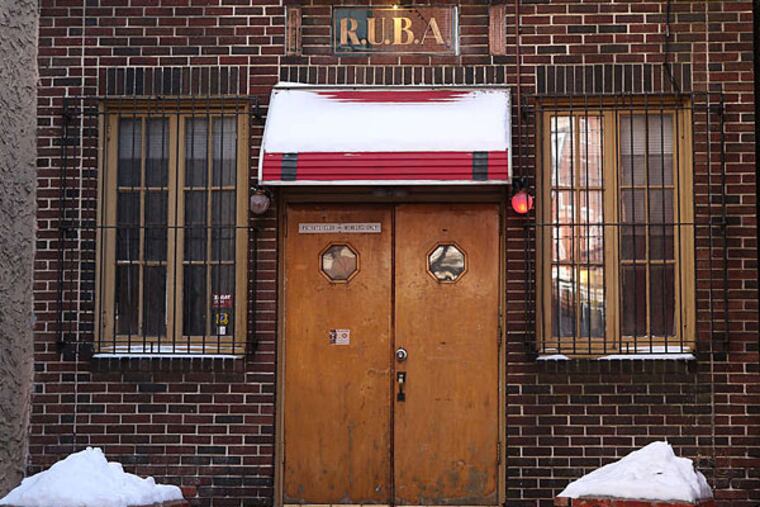RUBA: Still old-school but with new vibe
When the Russian United Beneficial Association opened its doors on Green Street in 1915, there was no bar, no performance space. The neighborhood wasn't even Northern Liberties when the group - designed to aid Russian immigrants in matters of start-up loans, insurance, and medical issues - first held its meetings there.

When the Russian United Beneficial Association opened its doors on Green Street in 1915, there was no bar, no performance space. The neighborhood wasn't even Northern Liberties when the group - designed to aid Russian immigrants in matters of start-up loans, insurance, and medical issues - first held its meetings there.
But it was a place where people were free to talk about their lives, here and back home, said member Roberto Hauber, a native of Odessa, who is now 76 and living in Delaware. Hauber visited regularly ("Sunday afternoons were best"), and his younger brother Val, 70, a former RUBA bartender, still goes for a nip after 2 a.m. (Yes, that's a.m.)
These days, the old brick building is called RUBA Club Studios - still a hangout for the Russian community ($35 for a membership), but also an after-hours space for public poetry readings, Fringe Arts theater events, indie band gigs, billiards, and Ping-Pong tournaments, as well as a place to get a bite to eat and take that last, one-for-the-road shot.
For a club that celebrated 100 years Saturday, it's a rare example of traditionalists' and trendsetters' coexisting.
Of its current 430 members, there are the Hauber types, and there are such people as Lee Porter, a newly minted member, who directs and produces My Ruined Life, a locally produced comedy Web series. He says he goes to RUBA because of its history and intimate vibe.
"I've seen super-talented musicians and DJs there, and you're right on top of them," said Porter, who recently used the club for a cast party celebrating the series' fourth season. "The second floor is like walking onto the set of a music video."
Not to mention, the club pulls in "a very energetic, eclectic, creative crowd."
The only thing missing from the RUBA of the past is its legendary shuffleboard table, even as so much of what used to be there remains intact: pianos, stage murals, cabinets.
Including the paperwork. RUBA booking manager Paul Impellizeri shows a guest the immaculately preserved bound books - meeting minutes from the 1920s, original deeds, signs reading "No ladies served at the bar" - from an ancient, weighty safe.
The club's transformation started with G. Rich Goldberg, who had been living on Green Street for seven years before two Russian men who were talking outside RUBA's front gate offered to show him upstairs in 2001.
"I had no idea the ballroom theater was there, fully intact. Blew me away," Goldberg said. "I knew then I wanted to do something with the place, or at least help the Russians carry it forward."
Goldberg, an arts entrepreneur and video-game producer, had always wanted a place to produce "stuff, events, artist projects," and found all that in RUBA.
"The history was so rich, every element - from the building's past making horse-carriage elements to RUBA's being involved in the everyday life of its members. We even found certificates for shares in a Russian summer resort."
By 2006, Goldberg took to wooing 11 Russian elders to convince them that he was trustworthy enough, "not a threat," to take over. It took four years.
"They couldn't carry on their mission, as its members were getting older," says Goldberg. "The business was running into the red, and their infrastructure was failing."
He bought RUBA in 2010 for about $1.2 million and became president of its club.
Goldberg says the bar and the booze was, for him, an afterthought, as he contends that he's not much of a drinker (though he tells a funny story about signing the final deal with the Russians, many bottles of vodka, and a long night turning into a midafternoon).
Now he wants to carry on its tradition of looking after members' health and welfare - not unlike Italian social clubs in South Philadelphia, or Polish-American clubs in Southwest Philadelphia - while also remaking the space into an arts garage of sorts.
"I want RUBA to take the concept of social clubs into the 21st century, like Flash Gordon, or Vlash Gordonski."
So far, it's working. Goldberg continues to book live events - although the club tries to keep the volume down because of the old-neighbor-filled block - and makes RUBA available as a community meeting place for everyone from the Fraternal Order of Police to local science, physics, and art clubs. (Proceeds from Saturday's birthday party went to the Physics Fund of Philadelphia.)
"I don't get there as often as I used to . . .," said Hauber, "since several of my friends passed away.
"But it's still a nice place to spend time talking about issues," he says, pointing to the continuing struggles between Russia and Ukraine. "The bands, the theater stuff, it's OK. And the new owner is a nice guy."